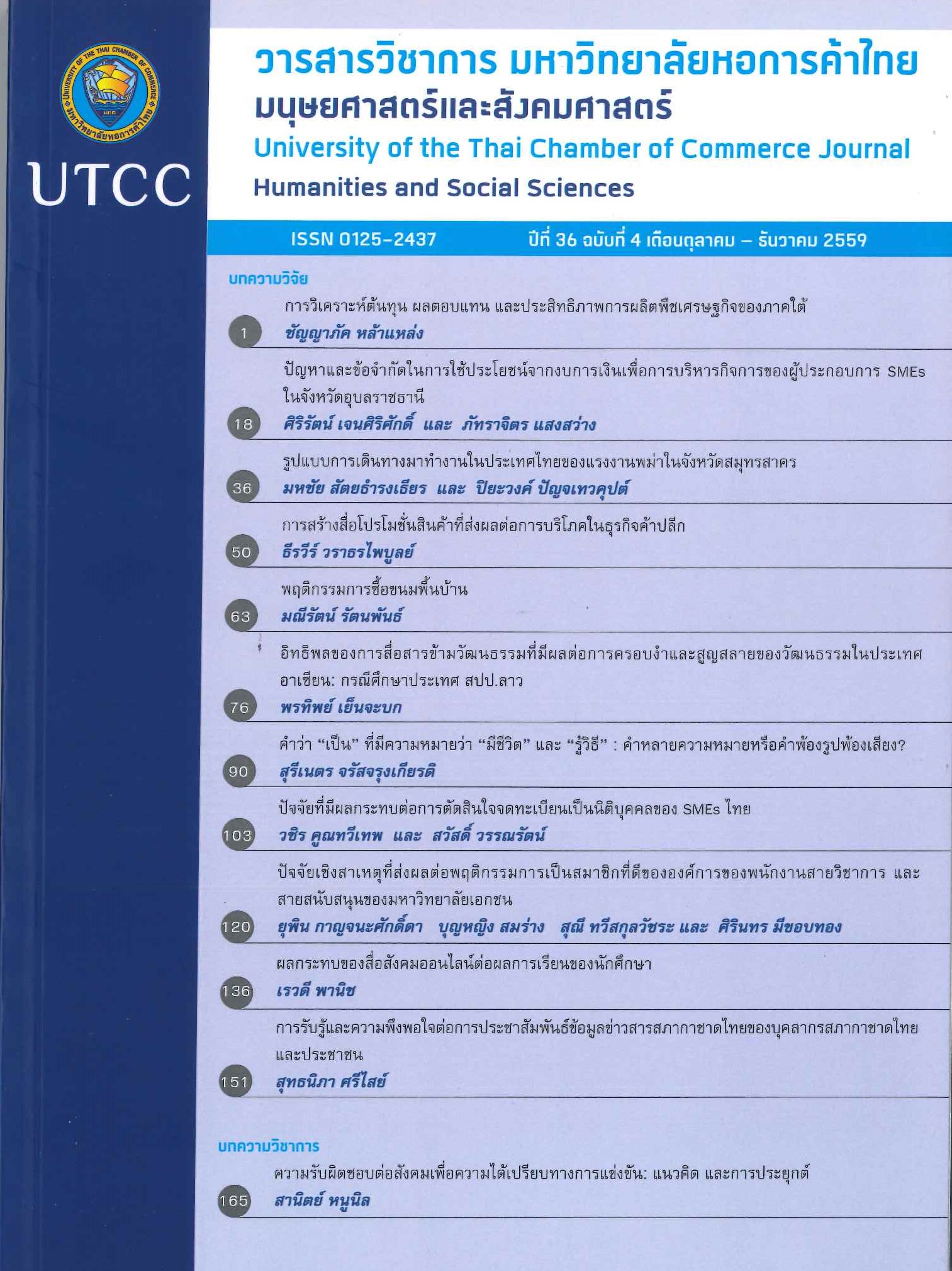Causal Factors Affecting Organisational Citizenship Behaviour of Academic and Support Staff in Private Universities
Main Article Content
Abstract
The research design of this mixed-methods research is triangulation design: convergence model. The purposes of this research were: 1) to study levels of job satisfaction, organisational commitment and organisational citizenship behaviour perceptions; 2) to study relationships between job satisfaction, organisational commitment and organisational citizenship behaviour; and 3) to study causal factors affecting organisational citizenship behaviour of academic and support staff in private universities, i.e. the University of the Thai Chamber of Commerce, Rangsit University and Huachiew Chalermprakiet University. The samples consisted of 219 academic staff and 225 supporting staff. The results indicated that the overall level of perceptions of academic and support staff was high. All pairs of variables of relationships had statistical significance (p-value < .01). The results of the study of causal factors affecting organisational citizenship behaviour showed that both academic and support staffs, organisational commitment directly affected their organisational citizenship behavior. Job satisfaction indirectly affected their organisational commitment. Besides, it also found that for academic staff, job satisfaction and organisational commitment could explain the variance in organisational citizenship behaviour at the level of 24%. As for support staff, could explain the variance in organisational citizenship behaviour at the level of 53%. The results of focus group stated that academic and supporting staff had satisfaction in job advancement and administrative policy. As for commitment, affective commitment and normative commitment were found. From the perspective of organisational citizenship behaviour, courtesy and conscientiousness were found. The results of in-depth interview with executives showed that higher education and academic rank development were academic staff competency improvement. Specific career competency was stressed as supporting staff competency improvement.
Article Details
ลิขสิทธิ์ของบทความ
ผลงานที่ได้รับการตีพิมพ์ถือเป็นลิขสิทธิ์ของมหาวิทยาลัยหอการค้าไทย ห้ามมิให้นำเนื้อหา ทัศนะ หรือข้อคิดเห็นใด ๆ ของผลงานไปทำซ้ำ ดัดแปลง หรือเผยแพร่ ไม่ว่าทั้งหมดหรือบางส่วนโดยไม่ได้รับอนุญาตเป็นลายลักษณ์อักษรจากมหาวิทยาลัยหอการค้าไทยก่อน
References
Bateman, T. S. and Organ, D. W. 1983. “Job Satisfaction and the Good Soldier: The Relationship Between a Left and Employee Citizenship.” Academy of Management Journal 26, 4: 587-595.
Greenberg, J. and R. A. Baron. 2003. Behavior in Organizations: Understanding and Managing the Human Side of Work. 8th ed. New York, NJ: Prentice-Hall.
Herzberg, Frederick., Mausner, Bernard., and Snyderman B. 1959. The Motivation to Work. New York: John Wiley.
Lomtaku, Wanlop. 2011. “Causal Factors Affective Organization Citizenship Behavior of Administrative Staff in Public Autonomous Universities.” Master’s thesis, Department of Management, Suranaree University of Technology. (in Thai).
วัลลพ ล้อมตะคุ. 2554. “ปัจจัยเชิงสาเหตุที่ส่งผลต่อพฤติกรรมการเป็นสมาชิกที่ดีขององค์การของพนักงานสายปฏิบัติการ มหาวิทยาลัยในกำกับของรัฐ.” วิทยานิพนธ์ปริญญาการจัดการมหาบัณฑิตสาขาวิชาเทคโนโลยีการจัดการ มหาวิทยาลัยเทคโนโลยีสุรนารี
Naweekarn, Somyos. 2006. Management and Organizational Behavior. Bangkok: Bhannakij. (in Thai).
สมยศ นาวีการ. 2549. การบริหารและพฤติกรรมองค์การ. กรุงเทพมหานคร: บรรณกิจ.
Organ, D. W. 1988. Organization Citizenship Behavior: The Good Soldier Syndrome. Lexington, MA: Lexington.
Organ, D. W. and Ryan, K. 1995. “A Meta-Analytic Review of Attitudinal and Dispositional Predictors of Organizational Citizenship Behavior.” Personnel Psychology 48: 775–812.
Podsakoff, P. M., et al. 2000. “Organizational Citizenship Behaviors: A Critical Review of the Theoretical and Empirical Literature and Suggestions for Future Research.” Journal of Management 26, 3: 513-563.
Prasertsin, Ujsara. and Chitayasothorn, Dulaya. “The Development of Indicators of Prosocial Behavior by Confirmatory Factor Analysis.” University of the Thai Chamber of commerce Journal 34, 3: 42-53, 2014. (in Thai).
อัจศรา ประเสริฐสิน และ ดุลยา จิตตะยโศธร. 2557. “การพัฒนาตัวบ่งชี้พฤติกรรมเอื้อต่อสังคมโดยวิธีการวิเคราะห์องค์ประกอบเชิงยืนยัน.” วารสารวิชาการมหาวิทยาลัยหอการค้าไทย 34, 3: 42-53.
Schappe, S. P. 1998. “The Influence of Job Satisfaction, Organizational Commitment and Fairness Perceptions on Organizational Citizenship Behavior.” The Journal of Psychology 132, 3: 277-290.
Tongkhao, Benjawan. 2003. “Human Resource Management in Faculty of Engineering. King Mongkut’s University of Technology Thonburi.” Master’s thesis of Public Administration, Burapha University. (in Thai).
เบญจวรรณ ทองขาว. 2546. "สภาพการบริหารทรัพยากรมนุษย์ในคณะวิศวกรรมศาสตร์ มหาวิทยาลัยเทคโนโลยีพระจอมเกล้าธนบุรี.” วิทยานิพนธ์ปริญญารัฐประศาสนศาสตรมหาบัณฑิต(สาขาการบริทั่วไป) มหาวิทยาลัยบูรพา


